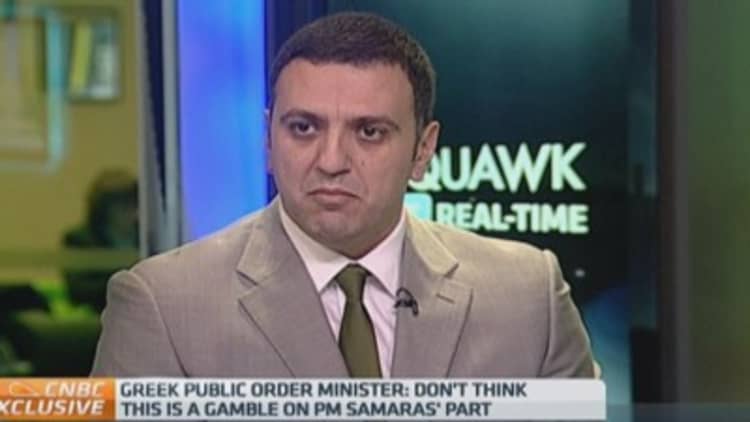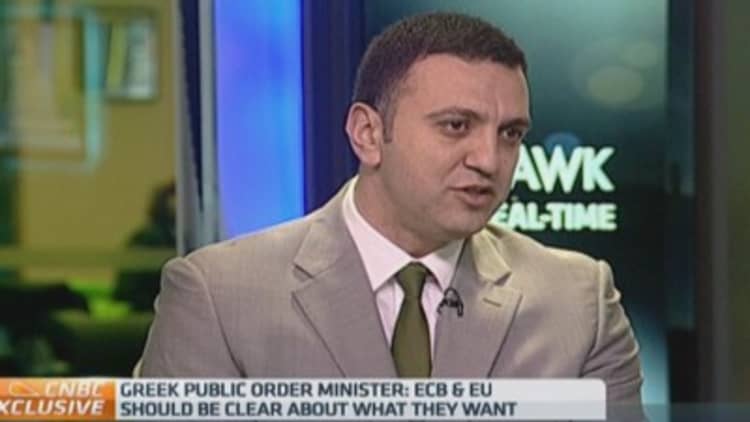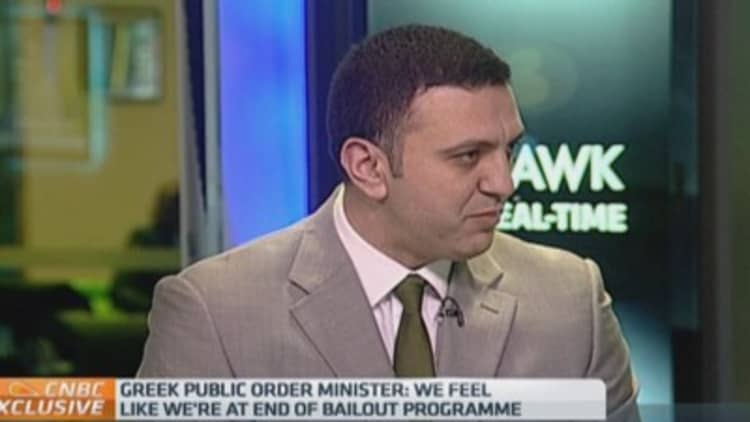


The Greek stock tailspin continued Thursday, on fears of further economic instability sparked by the prime minister's shock decision to bring forward presidential elections.
The Athens benchmark stock index fell nearly 8 percent on the day, following a near-13 percent crash on Tuesday after Greek Prime Minister Antonis Samaras announced that presidential elections would be held in December, rather than March next year.
Greek stocks are on pace for their largest weekly drop in at least 27 years, down 20 percent already. Yields on benchmark 10-year Greek debt have topped 9 percent, having started the week nearer 7 percent.
Analysts have struggled to interpret what appears to be a high-risk gambit by Samaras—a failure by lawmakers to elect his presidential nominee, Stavros Dimas, would trigger general elections, potentially causing the government to collapse. Samaras himself warned on Thursday that general elections would be held as soon as January if parliament failed to endorse Dimas.
On the flip side, the early installation of Dimas—a well-respected, pro-Europe candidate—could prompt international lenders to be more lenient as Greece seeks to exit its multibillion-dollar loan programs. Dimas formerly served as European Commissioner for the Environment, as well as Greece's Minister for Foreign Affairs.
Read MoreProtests in Greece expected over high unemployment
"Declarations from key European officials, including (German finance minister Wolfgang) Mr. Schauble and European Union Commissioner (Pierre) Moscovici seem to suggest that Samaras' decision to anticipate the presidential elections is part of a plan," said Credit Suisse analysts in a research note on Wednesday.
Credit Suisse rated Dimas' chance of success at under half—a view endorsed by Greek newspapers and political commentators.
Samaras has stated that the Greek people do not want general elections early next year, and appears to be waging that lawmakers will elect Dimas in deference to public opinion.
Vassilis Kikilias, a senior minister in Samaras' New Democracy party, denied on Thursday that the prime minister's gambit was risky.
"To be frank with you, I do not think it is a gamble, because either way we would have had the presidential vote and elections," said Kikilias, a former professional basketball player who now the minister for public order and citizen protection.
"The polls state clearly that the Greek people do not want elections. So I feel that being calm and realistic, MPs (members of parliament) will understand what the general opinion is, and we will hear the markets too."
The vote comes at a delicate time for Greece, with part of its bailout program set to end in two months' time. However, Kikilias said the early election of a new president would be a helpful indicator of future Greek policy, including to the so-called troika of international bodies that set the terms of Greece's bailout.
"Clear options are I think the best solution," he told CNBC. "Bring the election to December 17…and we have a clear signal towards the interior of the country, and towards European colleagues, and towards markets, and the other side of the Atlantic, that we want to deliver, we want to be solid."
Read MoreGood news! Greece is out of recession
'European family'
Kikilias said the troika needed to be "realistic" in setting terms for Greece's bailout exit, as well as mindful of the country's position in both the euro zone and the broader European Union.
"We do not understand why now, at the end of the program, they are pushing back so hard," he told CNBC. "I do believe in sitting around the table and negotiating, and so does my government, and so does Prime Minister Antonis Samaras…But the conclusion of the program has to be with realistic facts."
Former Greek Prime Minister Costas Simitis is among those who believe the elections of Samaras-nominee Dimas could induce leniency on the part of the Troika.
"There is no other way to stability, we must have elections," Simitis told CNBC on Wednesday.
Read MoreGreece can't afford another crisis: Former PM
No to Brexit
Kikilias said he was in favor of greater participation by the U.K. in European policymaking. "I think that would change the balance in Europe and maybe create a different potential for Europe's future," he told CNBC, but did not specify if he thought this would have led to more lenient terms for Greece's bailout.
The U.K.'s role in European policymaking is constrained, however, by its decision not to join the 18-country group that use the euro. Greater participation is unlikely in the short-run and Prime Minister David Cameron has promised to hold a referendum in 2017 on European Union membership if he is re-elected—although business groups such as the Confederation of British Industry say the U.K. should remain in the club.

